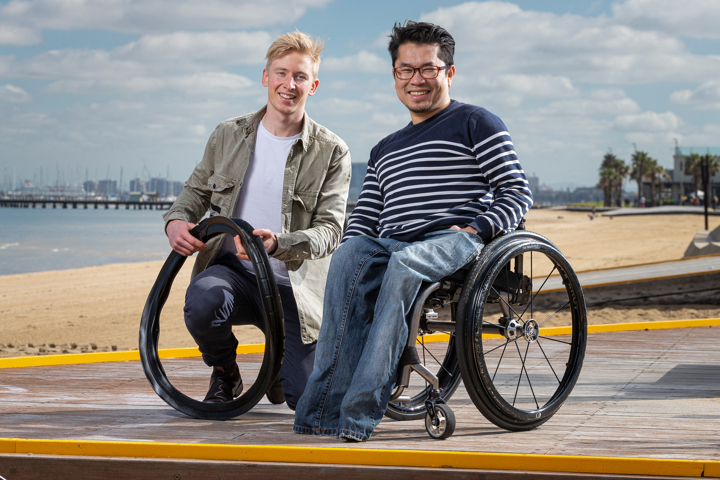Australia has over 10,000 beaches and its coasts are made up of 17% rainforest, making it difficult for manual wheelchair users to make the most of this beautiful rugged country. However this year’s Australian national James Dyson Award winner, 23 year old RMIT University student, Ryan Tilley, is addressing this problem with Gecko Traxx, a portable and affordable manual wheelchair accessory that enables off-road access.
One of Ryan’s close friends, a long-term wheelchair user would often get stuck in the sand when visiting beaches. This motivated Ryan to identify a problem that needed to be addressed: “I knew there had to be a better way for him to manoeuvre around off-road tracks. Current off-road wheelchairs and accessories are either really expensive or bulky. I wanted to build something that was far more accessible and offered the user a more independent experience.”
Ryan says: “I’m so excited for my design to be recognised by the James Dyson Award. I hope to bring my designs to life and that Gecko Traxx could one day give wheelchair users the opportunity to better explore our beautiful country without restrictions.”
How Gecko Traxx works
- The unique tyre cross-section is unobtrusive when fitted to the wheelchair and expands when in contact with the ground, increasing the contact surface area by three times when needed
- It’s been tested across a wide range of terrains including sand, snow, soft grass and gravel
- The simple, integrated clip can be used even with limited dexterity and enables the individual to fit the tyres to their wheelchair independently without the need to transfer out of the wheelchair.
This year, the three Australian judges included, Dr. Jennifer MacLeod, Senior Research Lecturer and Nanoscience Discipline Leader at Queensland University of Technology, 2017 International Top 20 entrant Lachlan Meadows and Professor Salah Sukkarieh, Professor of Robotics and Intelligent Systems at the University of Sydney. The trio reviewed 30 entries submitted from university students across the country before selecting the coveted title for the Australian winner, followed by two runner ups.
Professor Salah Sukkarieh comments: “The Gecko Traxx was the clear winner for me. It’s a simple yet effective design which addressed every aspect of the brief. It’s commercially viable, innovative and most importantly it could help people all over the world.”
The Runners Up
There were also two national runners up, whose designs were commended by judges: Eddy, designed by Alexander Ghent from the University of New South Wales and Continuity, designed by Frederique Sunstrum from the University of New South Wales.
Of the entries judge Dr. Jennifer MacLeod says: “I was really taken aback by the calibre of designs coming through for the James Dyson Award. It was extremely impressive and also inspiring to see what Australian students are creating and how passionate they are about solving real world problems.”
What is Eddy and how does it work?
- Eddy is a retrofittable filter system for washing-machines, designed to stop microplastic pollution from synthetic clothes from reaching the ocean.
- Microplastic pollution is one of the most serious threats to the marine environment and one of the largest contributors to this are the filaments released from synthetic clothing during washing.
What is Continuity and how does it work?
- Continuity challenges the current issues of invasive diabetic devices by taking advantage of the newest technology to monitor glucose levels and deliver insulin ‘non-invasively’.
- An ear device monitors glucose levels, which notifies the user when to take their insulin. The insulin is then admitted through a handheld oral device.
All three entries will now progress to the international stage of the James Dyson Award with the hope of winning up to AU$53,000** and AU$8,500*** for their university. Their entries will be judged by a panel of Dyson engineers who will select an international shortlist of 20 entries. The Top 20 projects are then reviewed by Sir James Dyson, who selects the international winner.
**Equivalent to £30,000 at time of payment
***Equivalent to £5,000 at time of payment



Share this page on